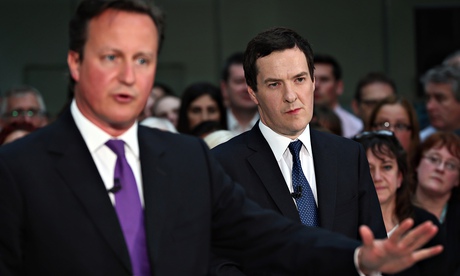
In Westminster and medialand George Osborne has a reputation as a master political strategist. He might have missed all his economic targets and been booed out of the London Paralympics. But this was the man, it was always said, who would set the traps to sink Labour and deliver a last-minute election turnaround in 2015.
After his autumn statement backfired so spectacularly this month, how can such claims still be taken seriously? It’s not just that he failed to meet his own objectives – on the deficit, debt and growth – while living standards have been continuously cut for the majority, and slashed for the poorest. After such a performance, any continuing talk of a “long-term plan” can only be met with derision.
What has made the chancellor look foolish is that his plans for austerity-without-end, drawn up to paint Labour into a corner, have instead rebounded on the Tories. Once the pliant Office for Budget Responsibility confirmed that Osborne’s plans for a budget surplus in the next parliament would reduce the state to 1930s proportions, even some of his most enthusiastic supporters jumped ship. The free-market Economist called his figures “nonsense” and warned that such cuts would “needlessly put the recovery at risk”.
The public response can be seen in the Guardian’s latest ICM poll, which records a drop of Tory support to 28% and a five-point Labour lead. David Cameron insists the cuts are “sensible”, but the voters clearly disagree. Two-thirds reject Osborne’s plan to balance the books by 2017-18 with still harsher austerity. Even a majority of Conservative voters are against it. Given that millions are now going hungry in Britain and food banks are booming in the sixth richest country in the world, maybe that is not so surprising. Nearly five years into the Tory-led coalition, most people are well aware that austerity is still cutting living standards and actually increasing borrowing.
The main reason Osbornomics has failed to meet its targets is that relentless cuts in real terms pay, throttled growth and rampant job insecurity have delivered lower tax receipts and boosted demand for benefits, while tax cuts for the wealthy have widened inequality. Austerity isn’t working in its own terms and there’s no reason to imagine that even more of the same will work any better. Conservative ministers and their media cheerleaders will counter that oil-assisted falling inflation means real wages are finally rising, just in time to save them from electoral defeat.
Maybe not. Latest figures show average earnings overtaking the government’s favoured consumer price index, but they still lag behind the retail price index, which includes housing costs. In fact, government forecasts don’t expect pay to outstrip RPI until 2017 – which means real wages are still likely to be falling for the majority next May. Last month only one in seven said they could feel a recovery where they lived.
Where Cameron, Osborne and their friends have succeeded, of course, is in convincing large numbers of people that Labour spending was somehow responsible for the crisis – which it wasn’t – and in turning the budget deficit into the central issue of economic policy – which it isn’t. In reality, the deficit was below 3% when the crisis was triggered by a financial crash – and up to that point public spending under New Labour, at 38.7% of national income, was lower than under every other government since the 1950s. And the budget deficit is only a reflection of the real problems in the economy and cannot be controlled by the government, as Osborne has demonstrated so comprehensively.
That’s because an economy is nothing like a household budget. At the economic level, one person’s spending is another’s income, and vice versa – and that’s most strikingly true of the government. But the deficit, which can currently be financed with little difficulty, has been elevated to an issue of supreme importance, revered by the whole political class. Now this deficit mania has been extended to balancing the budget – which even the disastrously deflationary eurozone fiscal pact doesn’t demand of its members, but Labour has allowed itself to be sucked into endorsing. Not only has Ed Balls signed up to eliminating the deficit (which has averaged 2.4% over the past 66 years) during the next parliament, but apparently to reducing debt as a share of national income as well.
Mercifully, Labour has left itself £30bn of room for manoeuvre over and above Tory plans, as well as excluding crucial capital spending from what would still be severe cuts. But by endorsing the goal of a balanced budget, Labour risks legitimising a City-driven austerity programme which is more about restoring profitability and appeasing corporate interests than about public sector housekeeping.
The real problems of the British economy are miserably low private investment, falling wages and productivity, a broken banking system and mushrooming private debt: very similar, in fact, to those that helped trigger the crisis we are still living through, with the added threat of a new deflationary spiral in the eurozone.
The only effective remedy is a public investment-led reconstruction of a broken economy. Parties that position themselves to Labour’s left – including the Greens, SNP and Plaid Cymru – are now demanding a break with austerity as a condition of support for a minority Ed Miliband government. One way or another, Osborne’s failure demands a real alternative.

